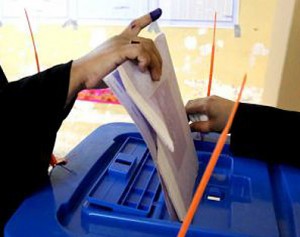Iraqis defy bombs to elect a new Parliament
Thursday, May 1st, 2014 4:00:07 by Nadeem Bajwa
Iraqis are voting from seven in the morning to elect a new parliament in the first elections since the withdrawal of foreign troops in 2011. Though the news of attacks in several parts of the country, local media reported on his attendance at the polls are. In total, 20.5 million citizens are entitled to vote. However, the violence, especially in the regions of Sunni population, raising fears that the participation of this community again be lower than average, thus aggravating their lack of voice in state institutions.
“These elections will result better than the previous because there are no U.S. troops on Iraqi soil,” Prime Minister Nuri al-Maliki was quoted by Agence France Presse.
Al Maliki, who was convinced he managed a third term, voted in the Al Rashid hotel in the heart of the Green Zone, one of the most visible legacies of the occupation and a reminder of the precarious security situation Iraq still lives.
To ensure the holding of the elections, the authorities have placed the country under curfew since ten o’clock last night and cars are banned from traveling in cities. Furthermore, in order to be deployed to full today, members of the armed forces and the various police forces rated between Sunday and Monday (91% according to the Electoral Commission).
Despite these extraordinary measures during the morning there have been mortars, grenades and bombs. An attack killed two women in Kirkuk, a policeman was killed when a suicide bomber has exploded at the entrance to a polling station and another facility has been destroyed by an explosion causing no casualties.
According to data collected by the UN mission in Iraq, nearly 3,000 people have died in attacks since the beginning of the year, an average of 25 a day. A lack of data from this April are published, and counted 750 dead.
After achieving a significant reduction in violence during his first term, Al Maliki is accountable now for a new wave of attacks and the resurgence of the Sunni insurgency. His authoritarian tendencies and focus of discontent in that community as a problem of terrorism certainly have deepened the sectarian divide that opened with the invasion of the country in 2003. Nevertheless, the regional environment, civil war in Syria and competition for influence between Iran and Saudi Arabia, have also exacerbated the situation.
As a result, government forces are embroiled in a bitter struggle against the Islamic State of Iraq and the Levant (EIIL), a splinter group of Al Qaeda and other Sunni insurgent groups in several provinces. The fighting, initially focusing on Al Anbar and Saladin have come to Abu Ghraib, just 30 kilometers west of Baghdad, Diyala, northeast.
The EIIL, which also extends its activities to neighboring Syria, has threatened Sunni candidates and voters not to participate in elections. In any case, only a limited number of polling stations will open in Al Anbar, where his militiamen and allied tribes control various locations for months. Although authorities have said the escape of these areas may vote in the places where they have taken refuge, insecurity will certainly affect the participation of Sunnis, encouraging the vicious circle of under-representation, discontent and violence that are sunk from the removal of Saddam Hussein.
Short URL: https://www.newspakistan.pk/?p=43451

















